The amazing Annie Cushing is moderator and introduced Craig Paddock up first.
Craig starts up and wants to change the title to Advanced Content Research. He brings up boxing equipment and boxing gear, the current results are identical. This was not that way ten years ago and it started converging so Google considers those key phrases synonymous even though the keywords don’t exist on the page.
A great place to start is the search console. There is no performance data though. You can link it to GA and then schedule the data to export on a monthly basis. It expires after 90 days. You can use SuperMetrics to export and automate the stuff.
Craig’s fav report is from AdWords. The “View:Day in Paid & Organic” in the dimensions tab. You can see the organic data and see the cannibalization.
For your branded query, should you be buying your name when you have the top organic listing. Roughly speaking, there is some cannibalization but the aggregate number of clicks is =30% when you are in both places.
We can still get some from Bing and small opportunities.
He often pulls the Google Organic landing page report to see the pages that are doing well. You can also use the paid search data. Site search is another example.
Regardless of what industry, they always see “reviews” and “complaints”. Make those pages on your site to get that up higher. Awards and certifications
Own your brand!
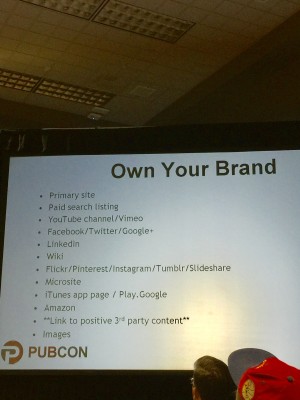
If you have something positive, you can link externally, you can increase the 3rd party content.
Screaming Frog – Pull competitors title tags!
Matched Search Queries is great to dive into under Google Analytics -> AdWords section.
Even though Google says paid ads con’t impact organic rankings… $2 million dollars later… They tried The second domain was only on paid and then they started getting links to it beyond their control, and it worked. So paid does affect organic.
When testing out, you can use the Adwords preview tool.
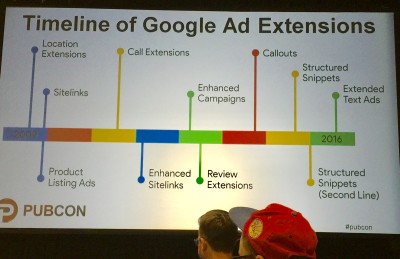
There are so many new Google Ad extensions. It’s constantly changing. They show better CTR when adding these on. Bing has the same thing as they just add them on after Google.
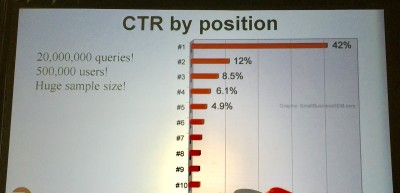
About ten years ago, there was a CTR by position from AOL. It was a huge sample so people thought it was correct. There was a few problems with that. That number today is different. If you segment branded by non-branded, it’s a decrease. It drops even greater when you include paid search ads. Now that the number 1 position drops down to 16% if you are looking at an unbranded key phrase that has paid search listings. It’s going to be 15% for that number one spot.
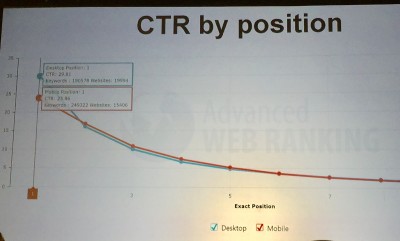
In summary, keyphrase research is more than popularity. Focus on content and use your paid search to guide your organic campaign.
Next up is Martin Weinberg from SEMRush
What problems does your audience have? What are the questions that come to mind? What are the thoughts they have before they come to Google? The answers are in your pocket. So how do you do this?
In Google, right now there is 3.3 billion searches every day. How many has Google never seen before? It’s 15%. Dang, that’s a lot. Half a billion searches a day are new, which is pretty mindblowing.
Go into the AdWords planner… it hasn’t seen those searches! So where is that going with the Panda update? Hummingbird? It wants to match meaning… Quality, content themes, and related items come to mind. So where do you look?
Google created the zero moment of truth ZMOT. First there is the stimulus, then the ZMOT where they get the problem/opp/question/thought. That is the keyword search. Then, they get the shopping aisle of results and hopefully get your website?
Did that pay off? Let’s get some need seed ideas. Map it out with volume and viability so you know which keywords are worth going after.
Let’s imagine a piano store. Let’s think of online communities, wikipidea. Get those keywords, content. Quora too… people are asking questions so see what they are saying and asking. Each one of those could be a blog post! It’s right there. Use auto-suggest in Quora.
Customer review sites are usually helpful too. You will notice a theme that comes up with keywords. As are discussion forums. Use your topic keyword and the word forum and find all that crowd sourced interest to audiences. BoardReader is an easy tool that will pull out keywords.
Grab some newsjacking and pull up trends in Twitter and other places.
Marty likes Answers to the Public since it pulls in data from Google. Obviously he likes SEMRush. SEOQuake which was before that.
Some great actionable tips from Marty Weinberg! @MartinWeinberg
SEMRush.com/pubcon16 – two week free trial of the GURU account.
Annie likes the tool Soovle. Try it!
Now up is Stephan Spencer @sspencer
Coauthor of The Art of SEO and Social ECommerce, and Google Power Search.
He’s not doing a power point, he’s going live! Starting with Soovle! He grabs a keyword and shows it on the page. Soovle seems awesome, I’ve never seen it.
He moves on to UberSuggest and then HitTail. HitTail is coming from different data but they would not tell us what it was.
Going more advanced, he moves over to analysis of competitors. He goes to SEMRush and gets keywords where they are already ranking and getting traffic. It’s merely an estimate of traffic but we do know what their average ranking is for the keywords. He goes to look at organic keywords.
Popping over to SimilarWeb, he goes to Traffic Sources/Search and gets the same sort of data on competitors based on traffic. Their dataset is pretty massive for competitive intelligence (like Alexa which is pretty laughable..), you can look for corroboration to see that it’s the same but you should have SimilarWeb in the mix as well. Another tool that does this is SearchMetrics.
From SearchMetrics, it’s in beta right now but this will blow your mind. You put in the keyword and get data back for popular kw, organic, traffic estimates, long tail… pull it into excel. So you pull it all together, you dedupe it, run some tests, and go into your keyword portfolio. SO that is awesome but he’s going to go over to the new Moz tool.
With Moz Keyword Explorer, the keyword suggestions you can look at the different sources that it’s pulling from. He’s going to include a mix of sources and not group them. He’s going to build a list and make a new list. Why are we putting it into a list? We want to see how healthy the portfolio is.
Let’s look at the list. What’s the SERP features, volume, difficultly to rank… super cool stuff! You can select the importance of those keywords and then recalculate the potential.
Moving on to RankRanger, he loves their ranking tracker for YouTube and more. You pop in the keyword but you can add some refinements. If you are into search query refinements called Google Power Search, it’s a little old… but the operators still work and it’s handy! He puts in “does not contain” “free” but also include the Avg CPC is less than $5.00. Sort by search volume, descending. The quick filters help too. He pops in questions.
What pops up?
Let’s go back to the blow your mind bit… SearchMetrics. You can see the topics clustered by semantic proximity.
See the different colors?
You can drill down to a particular topic. You can see which ones like each other. Which ones don’t. It’s pretty cool. You can also see breakdowns in different ways, like ranking distributions.
He continues to show the private beta which is pretty darn “bad ass”.
Woohoo, we all get a free book! Score!
Annie comes up and says truly mind blowing! We have a few minutes for questions but I have a PubCon lab to run to!
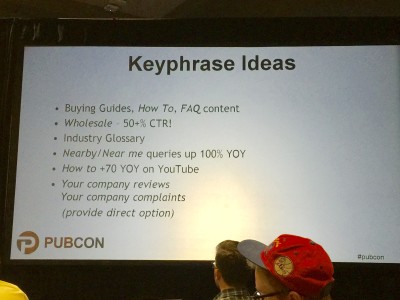
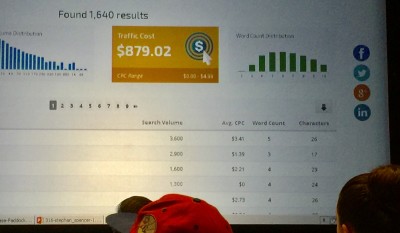
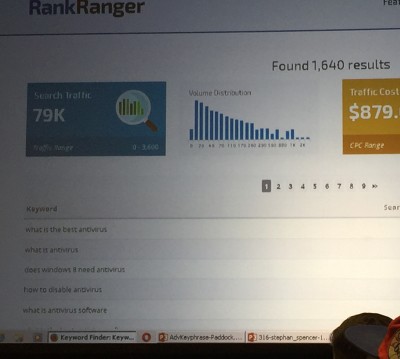
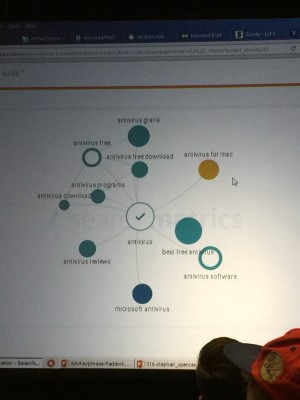

{ 1 comment }
My how things have changed since early 2000. The battle for page position is like the Game of Thrones. I find myself cracking the books once again in planning to take back the Iron Throne having once ruled the roost in 2011.
So thank you for the links, tools and a very thoughtful article.
Comments on this entry are closed.
{ 2 trackbacks }